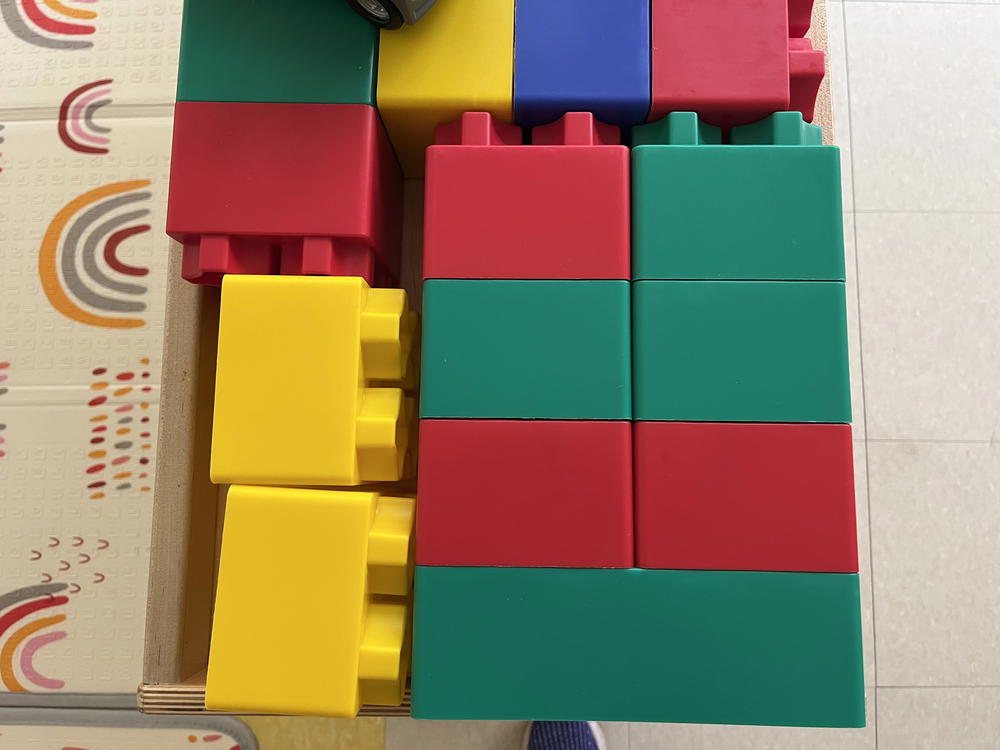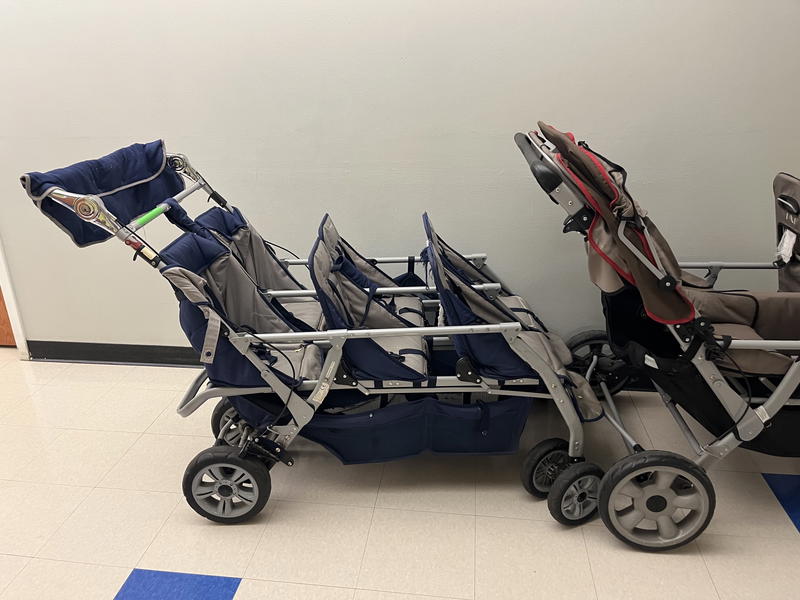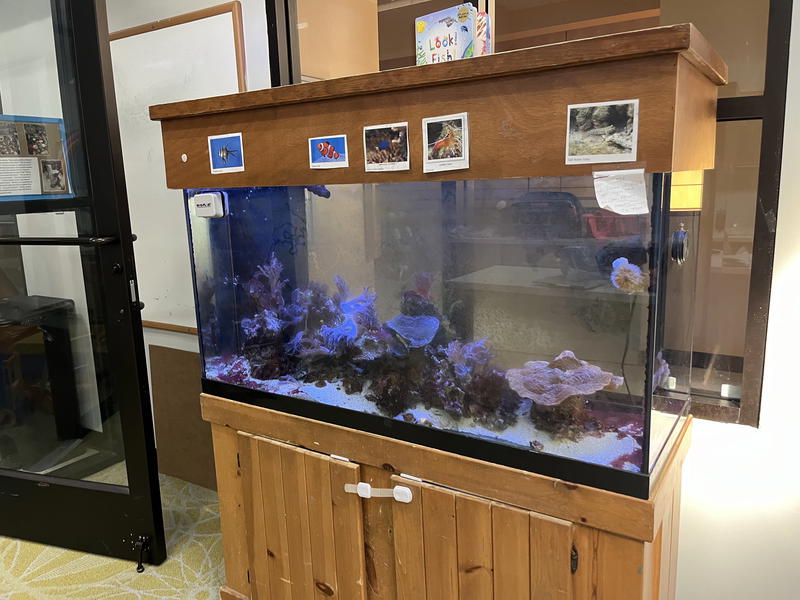Why We Chose the Benefits of Daycare (and Not a Nanny) for Our Child

It’s a tough choice: daycare, or a nanny? For us, the benefits of daycare were clear, from our toddler’s development, to costs, to the social aspect. See why we chose daycare.
This article may contain affiliate links. We earn a small commissions when you purchase via those links — and it's free for you. It's only us (Becca & Dan) working on this website, so we value your support! Read our privacy policy and learn more about us.
I never pictured us as a family who got a nanny to come to our home every day and care for our child, but that’s not to say I never considered it.
Once I learned about the benefits of daycare, I was drawn in, but it was hard to picture.
Months and almost a year into having a kid in daily daycare, it’s clear to me that the advantages of daycare every day of the week is better for us, but also outweighs the benefits of having a nanny.
Are you interested in why we sent our child to daycare rather than going the route of finding a nanny? Here’s what I consider the stand-out best parts of daycare that I couldn’t find with other types of care.
Cost
Daycare costs less than having a full-time nanny, at least where I live. In fact, it actually costs about two-thirds of the cost of a nanny, because the going rate seems to keep going higher and higher for quality nannies, and the cost of daycare seems stable (although it increases year over year).
With cost alone, daycare was a no-brainer for us. There are a few downsides to daycare when you compare objectively with hiring a nanny to care for your child, but based on the drain to our wallets, we went the daycare route for childcare.
While the costs in this article from Care.com do NOT align with the going rates in my area, it is helpful to see how the cost of daycare vs. nannies compares.
Social interaction
Social interaction is where I’ve been ear-to-ear smiling with how our daughter is doing. I think that daycare is crucial for letting children interact with each other socially from infancy to preschool age.
Developing sharing skills, friendship skills, communication skills and learning skills from children who’ve developed them first is priceless to me (well, it comes at the monthly fee of our daycare bill).
I also think that having our child in daycare during the workday and with caretakers who are not us—learning to trust them, accept food and mealtime from them, diaper changes from them and doing nap time with them—is valuable in terms of trusting role models.
But this transition to trusting new caregivers doesn’t happen overnight! Being prepared for what to expect during those first weeks of daycare can make the adjustment much smoother for everyone.

Activities
I could never possibly think of all the activities that our daughter has done in daycare, solely between 9 months to 18 months. She has gotten to draw on black paper with chalk, finger paint, use crayons, play with water and ice and even touch snow.
Sure, these sound like simple things, but when shown to infants and toddlers, everything is novel. One of my challenges as a parent is figuring out which activities are age-appropriate, and I leave it to the professionals to handle this and make things fun and exciting for our child.

Community
Upon deciding when to start our child in daycare, I knew that it was only days before I got the social aspect and community of daycare, as a parent. However, building that community takes time and effort. Knowing what to expect in those early days can help you make the most of the social opportunities that daycare provides.
That’s right: daycare isn’t just for babies and toddlers. It’s for parents, too.
Waving hi to other parents I was acquaintances with from other parts of my life—my “new parents” meetup where I had made new mom friends, or reconnecting with old friends as part of ways to stay sane on maternity leave—became part of my mornings, and my afternoons.
I started a Whatsapp group chat for the parents in our child’s class, as a way for us to share updates about the class staffing, school closures, teacher feedback and cute things the kids did. I made friends with a number of them, such that we’ve even had play dates with other children in the class and gotten to know the parents.
Next, there’s the events held at our daycare, as it’s part of a larger organization. There are toddler events just for toddlers, like a music class and then soft gym play, and there are parent events at nighttime for parents ony.
Very lastly, there is a parents committee. In this way, I’ve connected with the leadership of the daycare and the preschool and I’ve made connections with other parents who might have children at other levels in the school. Overall, community has been a huge part of the daycare experience and I don’t think we could achieve this if we had a nanny coming to our home every day.
Certified professionals
One thing I learned early on about myself as a first-time parent is that, newsflash: I’m like a new hire at a company I knew nothing about, and the company is “Parenting.”
Putting my child in the hands of professionals who have hopefully been taking care of children for years in a daycare environment is an excellent shot at having several eyes on my kid (given, in the sanctioned teacher-to-child ratio). It means there are professionals who know things like infant CPR and what to do if a baby is choking.
It is also helpful that they know things about my child’s milestones. We had “parent-teacher conferences” (I thought this sounded funny, but it turned out to be helpful!) and we had the two main teachers tell us about our infant’s development and where we should encourage working on new skills like walking or trying new foods.
Before-care and after-care
While most nannies work a standard 9-to-5, or have abridged hours according to your schedule, some daycares have before-care and after-care for an additional minimal fee.
Some people factor this in when choosing a daycare, although in our set of needs, we didn’t have to consider it.
At the daycare we chose, starting your child at the 7:30am time, or if you need to pick them up at 6pm because of your work hours or commute, adding in these additional times is only a marginal fee on top of the monthly fee. A nanny would probably have to be paid overtime, but daycare makes it affordable (comparatively).
Remember: You still have to give a nanny paid time off!
While we still have to pay for daycare when daycare is closed (national holidays, winter holiday break, end-of-summer break…) because we pay every month in full, nannies need paid time off, too! And if you’re paying your nanny 30% more than daycare would cost you, then remember that you’re paying someone’s annual full-time salary, and two weeks of PTO is usually typical.
Nannies’ legal rights are governed by the federal government in the US, so keep in mind that employing one means adhering to all of these requirements. You can see a ton more at this list of the Employment Rights of Nannies at Nanny.org, which helped me understand more.


